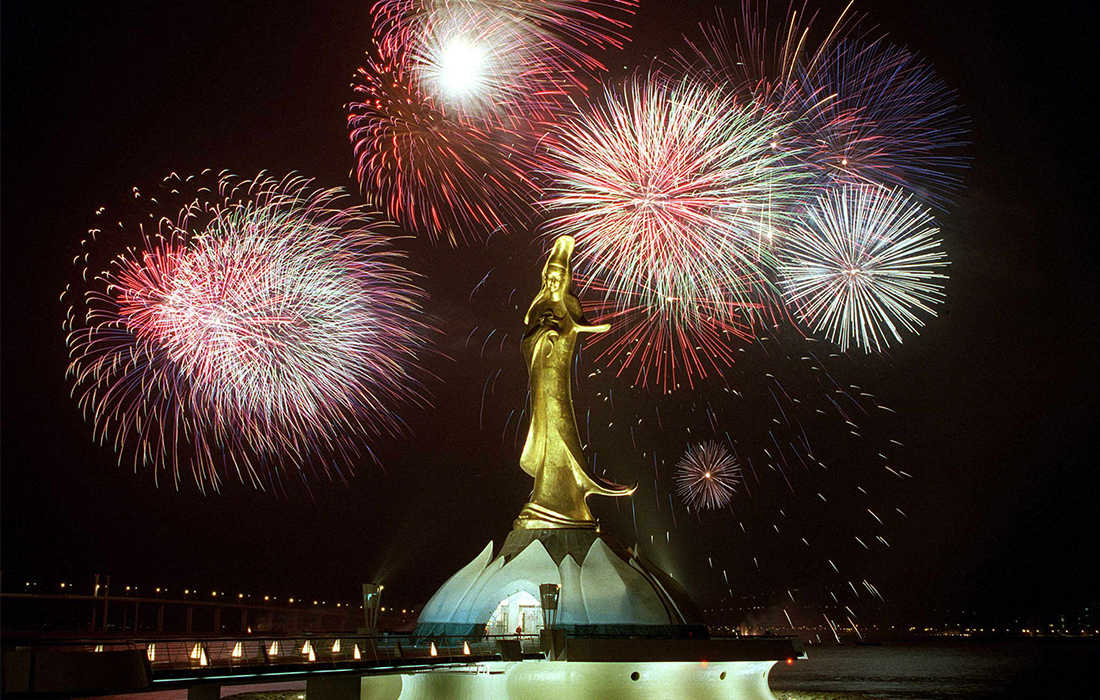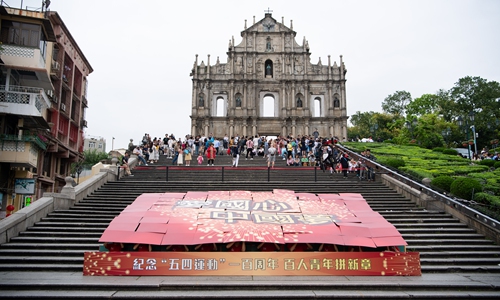National identity, legislation improvement behind success of Macao Basic Law
National identity, legislation improvement key elements, lacking in Hong Kong

Fireworks light up the night sky on December 20, 1999 over a statue of the Guan Yin, the goddess of mercy, to celebrate the return of Macao to China. The Portuguese enclave was handed back to China, ending 442 years of Portuguese administration. Photo: VCG
Against the backdrop of months of social unrest in Hong Kong, a grand forum to commemorate the 20th anniversary of the implementation of the Basic Law in Macao Special Administrative Region was held in Beijing on Tuesday with experts and officials discussing reasons for its success.Chinese analysts highlighted strong national identity, the perfection in legislation and residents' sense of patriotism as the main reasons that lead to the Basic Law's successful implementation. And these were exactly the same elements lacking in neighboring Hong Kong Special Administrative Region, they said.
"The success of the Basic Law in Macao demonstrates that the Basic Law could only be successfully implemented when the society reaches a broad agreement of national identity," China's top legislator Li Zhanshu told the forum.
Chen Duanhong, who is with the Law School of Peking University, noted at the forum that political loyalty is necessary to develop national identity and Macao has made great efforts in this regard over the past two decades.
After the return of Macao to the motherland, residents in the region, whether Chinese or foreigners, have maintained a "basic political loyalty to the country," Chen asserted. Political loyalty for Chen meant residents never undertook activities harmful to "national security." Such activities are banned by Article 23 of the Basic Law, including secession, infringement and damaging national sovereignty, Chen said.
Macao set up a law to safeguard national security in 2009, which fulfilled Article 23 of the Macao Basic Law.
Chinese experts have been urging Hong Kong's legislative body to pass the national security provision of Article 23 of the Basic Law for some time.
Without the heavier punishments stipulated in Article 23, only lighter sentences could be imposed on participants in the Occupy Central Movement, they noted.
In 2016, the Macao government proactively added secession clauses to its legislative council election system after the central government interpreted Article 104 of Hong Kong Basic Law. The clauses clarified that legislative council candidates must uphold the Macao Basic Law and pledge loyalty to the region. Council members are not allowed to take additional political posts in other countries.
The region also amended local law to protect the national flag, emblem and anthem in 2017. In 2018, the Macao government set up a regional committee to safeguard national security.

The skyline at night of the Macao Special Administrative Region, China Photo: IC
Besides legislation, Macao government has promoted the Basic Law to more than 10 middle schools to help students understand its intent and effects.
The government also popularized the law at primary schools using comics to engage students.
These moves in Macao met the governing needs in terms of construction of national institution and national recognition, said forum attendee Li Xiaobing, an expert on Hong Kong, Macao and Taiwan studies at Nankai University in Tianjin.
Li noted that the people and groups that "love the country and Macao SAR have played the leading role in the implementation of Macao's Basic Law."
This prevented a major constitutional crisis amidst the implementation of the Basic Law, Li noted.
The success of the Basic Law in Macao demonstrated the practicability of the "one country, two systems" principle and set an example for neighboring Hong Kong which has been embroiled by social unrest for months, He Liangliang, a commentator on the Hong Kong-based Phoenix TV, told the Global Times.
The Hong Kong government is not as proactive as the Macao government in implementing the Basic Law, He said.
Law Man-chung, a protester in Hong Kong who pleaded guilty to desecrating the Chinese national flag, was sentenced to 200 hours of community service in October, a punishment which many at the forum thought as too light, in contrast to a man who had sprayed paint on the front gate of the US Consulate General in Hong Kong was jailed for four weeks in August.
It is under the guidance of the Basic Law that Macao sustained its previous social mechanism, economic system and lifestyle, Chui Sai On, Macao chief executive, said at the forum.
The region implements high autonomy based on the Basic Law and enjoys administrative, legislative and independent judicial powers, Chui said.
Chui said that Macao residents enjoy extensive rights and freedoms in accordance with the Basic Law, ensuring economic growth and substantial progress in culture, education, social security and etc.




